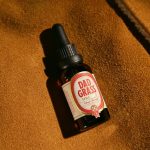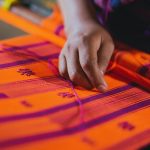Do you want to make more sustainable choices in your fashion? Understanding organic fabric’s role in sustainable fashion can help.
In this article, we’ll explore the impact of conventional fabrics and why organic fabrics are the better choice.
Discover the benefits of organic cotton, the eco-friendly properties of hemp, and the versatility of linen.
Learn how to incorporate these organic fabrics into your wardrobe and make a positive impact on the environment.
Table of Contents
The Impact of Conventional Fabrics
Conventional fabrics have a significant environmental and social impact. The conventional fabric industry, with its large-scale production and high demand, contributes to various environmental issues. One of the major concerns is the excessive use of water. The production of conventional fabrics requires a substantial amount of water for processes like dyeing, bleaching, and finishing. This leads to water pollution due to the release of harmful chemicals and dyes into rivers and water bodies.
Moreover, the conventional fabric industry heavily relies on synthetic fibers derived from non-renewable resources such as petroleum. The extraction and processing of these resources contribute to air pollution and greenhouse gas emissions, exacerbating climate change. Additionally, the production of conventional fabrics involves the use of toxic chemicals, including pesticides and herbicides, which have detrimental effects on both human health and the environment.
Furthermore, the conventional fabric industry is often associated with poor working conditions and low wages for garment workers, particularly in developing countries. This social impact raises concerns about labor rights and fair trade practices within the industry.
What Makes Organic Fabrics Sustainable
When it comes to understanding what makes organic fabrics sustainable, there are several key points to consider.
Firstly, organic fabrics offer significant environmental benefits, as they’re produced without the use of harmful chemicals and pesticides that can pollute waterways and harm ecosystems.
Secondly, organic fabrics also provide health advantages, as they’re free from toxic residues that can be absorbed by the skin.
Lastly, choosing organic fabrics aligns with ethical considerations, as they support sustainable farming practices and fair trade principles.
Environmental Benefits of Organics
To understand the environmental benefits of organic fabrics, you should consider the reduced use of pesticides and synthetic fertilizers in their production. This is one of the key advantages of organic farming practices, which prioritize sustainability.
Conventional cotton farming, for example, heavily relies on pesticides and synthetic fertilizers to control pests and boost crop yields. However, these chemicals have detrimental effects on the environment. They contaminate soil, waterways, and air, posing risks to local ecosystems and human health.
Health Advantages of Organics
By choosing organic fabrics, you can regularly contribute to a more sustainable fashion industry and enjoy the health advantages they provide.
Organic fabrics are beneficial for your skin as they’re free from harmful chemicals and pesticides. Traditional fabrics are often treated with numerous chemicals during production, which can irritate the skin and cause allergies. However, organic fabrics are made from natural fibers that have been grown without the use of synthetic pesticides or fertilizers. This means that they’re gentler on the skin, reducing the risk of irritation and allergic reactions.
Additionally, organic fabrics are usually processed using eco-friendly methods, further minimizing the exposure to harmful substances. So, by opting for organic fabrics, you not only prioritize your skin’s health but also contribute to a more sustainable and ethical fashion industry.
Ethical Considerations for Organics
To understand the ethical considerations that make organic fabrics sustainable, it’s important to delve into the production processes and labor practices involved in their creation. Ethical sourcing is a key aspect of organic fabric production. This means that the materials used in the fabric are obtained from sources that prioritize environmental and social responsibility.
Organic cotton, for example, is often sourced from farmers who use sustainable farming practices and avoid harmful chemicals. Fair trade is another important consideration in the production of organic fabrics. This ensures that the workers involved in the fabric’s creation are paid fair wages and have safe working conditions.
Benefits of Organic Cotton
Organic cotton offers numerous benefits that make it an eco-friendly alternative to conventional cotton.
By choosing organic cotton, you can contribute to the reduction of harmful chemicals and pesticides in the environment.
Additionally, organic cotton is also beneficial for consumers as it’s hypoallergenic and free from toxic residues that can potentially harm your health.
Eco-Friendly Alternative to Conventional Cotton
When it comes to sustainable fashion, you can make a positive impact on the environment by choosing an eco-friendly alternative – organic cotton. Organic cotton is produced through eco-friendly manufacturing processes and sustainable farming practices, making it a more environmentally conscious choice compared to conventional cotton.
Benefits of Organic Cotton
| Eco-Friendly Manufacturing | Sustainable Farming |
|---|---|
| Reduces chemical usage | Preserves soil fertility |
| Lowers greenhouse gas emissions | Conserves water resources |
| Promotes biodiversity | Protects farmers’ health |
| Supports fair trade practices | Eliminates GMOs |
Organic cotton is grown without the use of harmful pesticides and synthetic fertilizers, reducing chemical contamination of the soil and water sources. This promotes soil fertility and protects the health of farmers. Additionally, organic cotton farming practices minimize greenhouse gas emissions and conserve water resources. By choosing organic cotton, you are not only supporting eco-friendly manufacturing but also contributing to the preservation of biodiversity and fair trade practices. Make a sustainable choice for both your style and the environment by opting for organic cotton.
Health Benefits for Consumers
By choosing organic cotton, you can experience numerous health benefits as a consumer. Here are three reasons why organic cotton is a healthier choice for you:
-
Reduced exposure to harmful chemicals: Organic cotton is grown without the use of toxic pesticides and synthetic fertilizers. This means that the clothes made from organic cotton are free from harmful residues that can be absorbed by your skin. By avoiding these chemicals, you can reduce the risk of skin irritations, allergies, and other health issues.
-
Better for sensitive skin: Organic cotton is naturally softer and gentler on the skin compared to conventional cotton. It’s hypoallergenic, making it an ideal choice for those with sensitive skin or conditions like eczema. By wearing organic cotton clothing, you can minimize skin irritations and discomfort.
-
Meeting consumer preferences: As more people become aware of the potential health risks associated with conventional cotton, there’s a growing demand for organic cotton products. By choosing organic cotton, you’re supporting sustainable and ethical practices while prioritizing your health.
Exploring Hemp as an Eco-Friendly Fabric
You can explore the benefits of using hemp as a sustainable fabric for eco-friendly fashion. Hemp is a versatile and eco-friendly plant that has been used for centuries for various purposes. When it comes to fabric production, hemp stands out as a sustainable option due to its unique properties and farming methods.
Hemp farming methods play a significant role in its sustainability. Unlike conventional cotton, hemp requires less water and no pesticides or herbicides to grow. It’s a resilient plant that can thrive in various climates and soil types, making it a low-maintenance crop. By choosing hemp as a fabric, you’re supporting a farming practice that promotes environmental conservation.
Another advantage of hemp as a fabric is its durability. Hemp fibers are known to be strong and long-lasting, making hemp garments more resistant to wear and tear compared to other fabrics. This means that your hemp clothing will last longer, reducing the need for frequent replacements and ultimately reducing textile waste.
By incorporating hemp into your wardrobe, you’re making a conscious choice to support sustainable fashion. With its eco-friendly farming methods and durability, hemp is a fabric that aligns with your values of environmental responsibility.
The Versatility of Linen in Sustainable Fashion
Linen holds a prominent place in sustainable fashion due to its versatility and eco-friendly qualities. When it comes to creating a sustainable wardrobe, linen is a fabric that shouldn’t be overlooked. Here are three reasons why linen is a versatile choice for sustainable fashion:
-
Linen’s durability: One of the key characteristics of linen is its exceptional durability. Linen fibers are known for their strength and resilience, making garments made from linen last longer than those made from other fabrics. This means that investing in linen pieces for your wardrobe ensures that they’ll stand the test of time, reducing the need for frequent replacements and ultimately decreasing your environmental impact.
-
Linen’s breathability: Another remarkable feature of linen is its breathability. The natural fibers of linen allow air to circulate freely, making it an ideal fabric for warm weather. Linen’s breathability helps to regulate body temperature, keeping you cool and comfortable even on the hottest days. By choosing linen, you can enjoy the benefits of a fabric that not only looks stylish but also feels great to wear.
-
Linen’s versatility: Linen is a versatile fabric that can be used to create various styles and silhouettes. Whether you prefer a casual and relaxed look or a more polished and sophisticated ensemble, linen can be easily adapted to suit your personal style. From lightweight shirts and dresses to tailored pants and blazers, linen offers endless possibilities for creating a sustainable and fashionable wardrobe.
How to Incorporate Organic Fabrics in Your Wardrobe
To incorporate organic fabrics into your wardrobe, consider exploring the wide range of sustainable options available. Sustainable fashion is becoming increasingly popular as consumers become more conscious of the environmental impact of the fashion industry. By incorporating organic fabrics into your wardrobe, you can contribute to a more sustainable and eco-friendly fashion industry.
One way to incorporate organic fabrics is by choosing clothing made from organic cotton. Organic cotton is grown without the use of harmful pesticides and chemicals, making it a healthier and more sustainable option. Look for clothing labels that indicate the use of organic cotton, or consider purchasing from brands that prioritize sustainability.
Another option is to explore fabrics made from bamboo or hemp. These materials are known for their sustainability and durability. Bamboo fabric is soft, breathable, and naturally antibacterial, making it a great choice for everyday wear. Hemp fabric, on the other hand, is durable and has natural UV protection, making it ideal for outdoor activities.
When shopping for organic fabrics, look for certifications such as GOTS (Global Organic Textile Standard) or OCS (Organic Content Standard). These certifications ensure that the fabrics are produced according to strict organic standards.
Incorporating organic fabrics into your wardrobe is a simple yet impactful way to support sustainable fashion. By choosing organic fabrics, you can make a positive difference in the fashion industry and contribute to a more sustainable future.
Frequently Asked Questions
Are Organic Fabrics More Expensive Than Conventional Fabrics?
Organic fabrics can be more expensive than conventional fabrics, but they are worth the investment. By choosing organic fabrics, you contribute to reducing the environmental impact of conventional fabrics and support sustainable fashion.
Where Can I Find Clothing Made From Organic Fabrics?
You can find clothing made from organic fabrics at various eco-friendly fashion stores and online retailers. The benefits of organic fabrics include being better for the environment, your health, and supporting sustainable practices.
Are Organic Fabrics Better for People With Sensitive Skin?
Yes, organic fabrics are better for people with sensitive skin. They are made without harmful chemicals and pesticides, reducing the risk of irritation and allergies. Organic fabric production focuses on sustainability and environmental responsibility.
How Do Organic Fabrics Contribute to Reducing Water Pollution?
Organic fabrics contribute to reducing water pollution and minimizing environmental impact. By using organic materials, you can help decrease the amount of harmful chemicals released into water sources, promoting a cleaner and healthier planet.
Can Organic Fabrics Be Recycled or Composted at the End of Their Life Cycle?
Yes, organic fabrics can be recycled or composted at the end of their life cycle. This provides recycling options and composting benefits, contributing to a more sustainable and eco-friendly fashion industry.
- How Does Ring Spun Cotton Affect Garment Fit and Shape Retention? - August 13, 2024
- What Are the Challenges in Producing Ring Spun Cotton? - August 13, 2024
- Is Ring Spun Cotton Suitable for Plus-Size Clothing? - August 13, 2024





